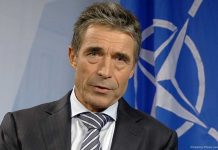After Wikileaks’ revelation of secret NATO plans to defend the Baltic states and Poland in the event of a Russian attack, Russia’s envoy to the alliance, Dmitry Rogozin, demanded from NATO “to publicly give up military plans against Russia.”
According to the latest diplomatic memo released from WikiLeaks, NATO officials had feared “an unnecessary increase in NATO-Russia tensions,” and wanted no public discussions of their contingency plans to defend Baltic states from Russian attack.
However, now that the plans are public, tensions have increased.
The latest batch of U.S. embassy cables released by Wikileaks shows NATO drew up plans in January to defend the Baltic states of Estonia, Latvia and Lithuania against any possible attack by Russia.
NATO spokeswoman, Oana Lungescu, said on Tuesday that NATO and Russia are not enemies but that the alliance is always ready to defend its members, including the Baltic states.
Although NATO’s core task is to defend its members, the alliance had not prepared detailed military plans for the defense of Estonia, Latvia and Lithuania since they joined in 2004. After Russia’s victory in the 2008 war with Georgia, the three began pressing for a greater U.S. and NATO presence in the region.
Revealing the plans to defend the Baltics might have a negative effect on cooperation between the former Cold War rivals.
At the end of November, NATO condemned the release by WikiLeaks of diplomatic cables detailing the deployment of US tactical nuclear weapons in Europe. The leaks were described as “illegal and dangerous“.
The founder of this controversial website, Julian Assange, was arrested in London on Tuesday, just days after WikiLeaks published the first batch of over 250,000 confidential U.S. diplomatic cable.
Source: Associted Press and RIA









